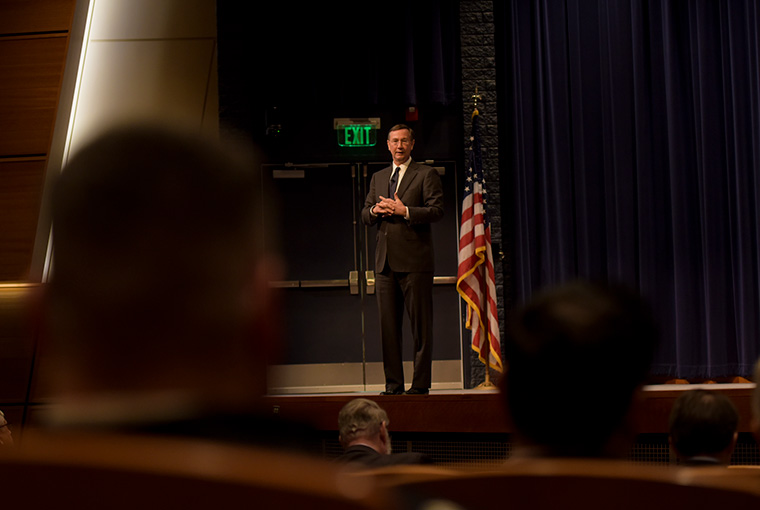Chief Learning Officer Visits Campus to Discuss New Education for Seapower Strategy

NEWPORT, R.I. -- Department of the Navy Chief Learning Officer John Kroger spoke to U.S. Naval War College faculty and staff Feb. 27 about the institution’s place in the new Education for Seapower Strategy 2020, released March 2 by U.S. Navy and U.S. Marine Corps leaders.
Kroger said the college has an important role in the new blueprint, as the strategy calls for more higher education for the armed forces in order to compete with increasingly sophisticated rivals.
“In a world where the United States no longer has massive economic and technological advantage, where we are dealing with potential peer adversaries for the first time in 30 years, we’re going to have to be able to outthink opponents in order to outfight them,” Kroger told his audience in Spruance Auditorium.
The Department of Navy education plan dovetails with an initiative announced last week by Rear Adm. Shoshana S. Chatfield, Naval War College president, to work with the faculty to revise the college’s strategic vision.
“Obviously, the U.S. Naval War College is positioned to play a very key role in this strategy,” Kroger told the staff and faculty. “We need to send more officers to more graduate education, and we need to do that in ways that are directly tied to our warfighting capability.”
Presently, each year 2.7% of U.S. Navy officers are in some type of graduate education, but that number needs to climb significantly, Kroger said.
Some of the increase will come at the U.S. Naval War College, the Naval Postgraduate School in Monterey, California, and civilian higher-education campuses, Kroger said. The number of military students from foreign partners and allies will rise as well, following a call by Secretary of Defense Mark Esper for a 50% increase in foreign officers attending U.S. military schools.
But Kroger said the U.S. Navy can’t get the job done solely with traditional in-residence education programs.
The Education for Seapower Strategy directs the creation of a new midcareer online curriculum for officers. Additionally, the naval services will embrace “low-residence” education, a term that describes programs where students might travel to a traditional classroom a few times a month and work remotely the rest of the time.
“I’m very hopeful that the U.S. War College faculty will play a role in designing what this thing looks like,” Kroger said about the new online curriculum. About low-residence education, he said, “It will be a question for this community to figure out if you want to try to build some low-residency programs here on campus.”
For enlisted Sailors, the new Naval Community College program will welcome its first group of enlisted students in January 2021.
Civilian U.S. Navy employees will also have access to the Naval Community College program, Kroger said. For midcareer civilians, a newly authorized program will send midlevel managers to get master’s degrees in disciplines such as management and finance.
“All of this comes together in what is a strategy to try to lift the educational level of every single element of our force,” Kroger said.
The strategy will require more resources for education, including money that has already been allocated to the U.S. Naval War College in budgets for this year and next, he said.
“It’s a recognition that in our current geopolitical environment, our single biggest potential advantage is the quality of our people,” Kroger said.
To view his remarks: https://youtu.be/Ina9cuz9E_o
To view photographs: https://www.flickr.com/photos/usnavalwarcollegeri/albums/72157713280053557
